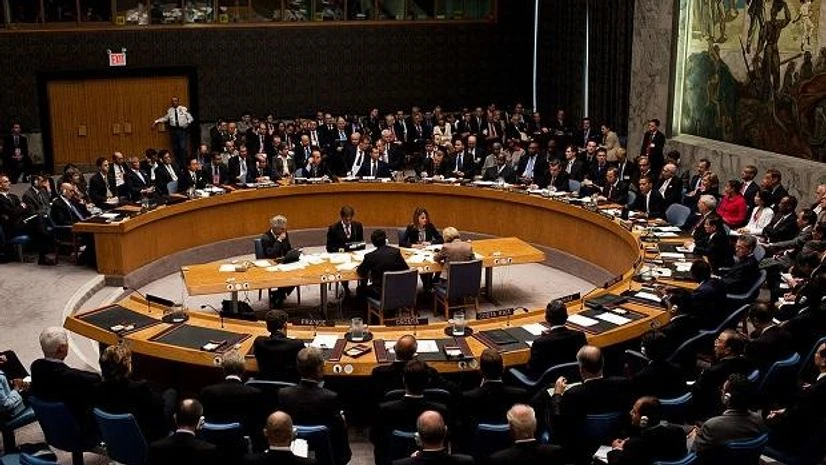India, which has been at the forefront of the years-long efforts to reform the UN Security Council, on Friday began its two-year tenure as a non-permanent member of the powerful organ of the world body.
India will sit in the 15-nation United Nations Security Council (UNSC) for the 2021-22 term as a non-permanent member - the eighth time that the country has had a seat on the powerful horseshoe table.
In 2021, India, Norway, Kenya, Ireland and Mexico join non-permanent members Estonia, Niger, Saint Vincent and the Grenadines, Tunisia and Vietnam and the five permanent members China, France, Russia, UK and the US in the Council.
India will be UNSC President in August 2021 and will preside over the Council again for a month in 2022.
The presidency of the Council is held by each of the members in turn for one month, following the English alphabetical order of the Member States names.
Also Read
India's Permanent Representative to the UN Ambassador T S Tirumurti has said that as the world's largest democracy, India will promote fundamental values like human rights and development and reinforce multilateralism while underlining the need for greater cooperation in the United Nations Security Council.
"As the largest democracywe will be promoting very fundamental values like democracy, human rights and development," India's Permanent Representative to the UN Ambassador T S Tirumurti told PTI.
India's message will also be to ensure "how do we let diversity flourish in a united framework, which is in many ways the United Nations itself. This is something which India as a country, as what we stand for will take to the Council.
Tirumurti had said India will "definitely" emphasize a greater need for cooperation in the Council, which should not be a place where "because of any paralysis of decision making, urgent requirements don't get properly focused. We would like to have a more cooperative structure in which we genuinely look out and find solutions and go beyond the rhetoric."
India will also underscore the importance of respect for rule of law and international law.
"The current multilateralism is not factoring in multipolarity. When you have a structure, which is able to accommodate the multipolarity in a multilateral framework, then automatically (there is) a more responsive, more rule-bound and more inclusive process," he said, adding that "obviously, this will lead to reform in the multilateral system."
"Broadly these are some of the messages which we will carry in various degreesWe will be a country which will reinforce multilateralism. That would be the biggest strength of India in many ways when it gets into the Security Council, he said.
Tirumurti has outlined counter-terrorism, peacekeeping, maritime security, reformed multilateralism, technology for the people, women and youth and developmental issues, especially in the context of peace building, as India's priorities for the UNSC tenure.
"I feel that India's presence in the Security Council is needed at this juncture when there are deep fissures between P-5 themselves and also between other countries. UN is losing coherence and we hope to bring this back by focusing on issues of priority to all Member States, he had said.
India has been at the forefront of the years-long efforts to reform the Security Council, saying it rightly deserves a place as a permanent member of the council, which in its current form does not represent the geo-political realities of the 21st century.
On the long-delayed UNSC reforms, Tirumurti criticised the lack of progress and said that hardly anything has happened in the last decade.
"Not a single thing has moved. Is this the type of process we want or can we collectively come to a slightly better process which will yield results."
He underlined that it is time for a "genuine process" wherein Member States work with a single text for negotiations.
Tirumurti further said that in the last few months, he has tried to define India's interests a "bit more sharply," including on the question of terrorism.
"We have said that let us pursue terrorism with a single-minded determination and not start giving excuses and justifications for these," the Indian envoy said.
India will also look at very specific issues which are on the agenda of the council, relating to countries, specific topics, he said.
"What will happen is that the trend of the last few months of trying to define our interests a bit more sharply will continue as we go into the UNSC," he said.
Tirumurti has emphasised that in the Security Council, India will be a strong voice for the developing world.
"We will be a country which will stand up for developing countries."
Addressing the virtual high-level General Assembly session in September, Prime Minister Narendra Modi had said that as a Security Council member, India will not hesitate to raise its voice against the enemies of humanity, including terrorism and will always speak in support of peace, security and prosperity.
Modi had also asserted that reform in the responses, processes and in the very character of the United Nations was the "need of the hour as he questioned that for how long will India, the world's largest democracy and home to 1.3 billion people, be kept out of the decision-making structures of the UN.
India, the endorsed candidate from the Asia-Pacific States, won 184 votes out of the 192 ballots cast in the elections in June for the five non-permanent seats of the Security Council.

)
